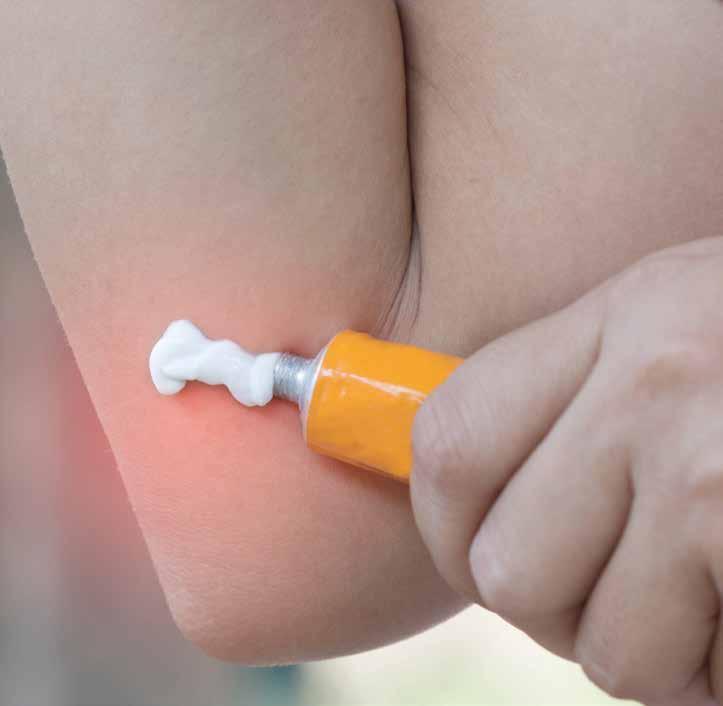
4 minute read
Fertility
PREGNANCY AND FERTILITY
It is a noticeable trend that many people are now starting families older, and this trend is set to continue. More women than ever are deciding to have children later in life, and thus many will turn to their community pharmacy for ovulation and pregnancy self-testing kits, supplements and advice. Because there is such an extensive array of these products available today, selecting the appropriate test or supplement may be overwhelming and confusing to many.
TESTING PRODUCTS
A variety of at-home diagnostic tests are available for detecting ovulation and pregnancy. Pharmacies can be a valuable resource for women electing to use these tests by aiding in both their selection and proper use. Approximately one in six women in Ireland face fertility problems that interfere with achieving a successful pregnancy. Some women ovulate irregularly, and/or the male’s sperm count may have dropped.
Ovulation tests
Devices used for ovulation prediction monitor the natural hormonal changes that occur during a woman’s menstrual cycle. OTC products available for predicting ovulation include thermometers measuring basal body temperature (BBT), urine tests, fertility microscopes, and saliva tests. Factors that may be considered when selecting a method of testing include ease of use, patient preference, and cost.
Urine-based ovulation tests use monoclonal antibodies specific to luteinizing hormone (LH) to detect the surge of LH.These tests should be used 2 to 3 days before estimated ovulation, and once the LH surge has been detected, testing should be discontinued. Ideally, earlymorning collection is recommended because the LH is most concentrated at this time.
If the test cannot be performed immediately, the urine sample should be refrigerated for testing later the same day. The sample should be returned to room temperature before testing.
Home pregnancy tests
Home pregnancy tests are designed to detect the presence of human chorionic gonadotropin (hCG) hormone in urine samples. These tests use monoclonal or polyclonal antibodies in an enzyme immunoassay. Early pregnancy tests enable women to confirm a pregnancy and receive early prenatal care. When advising patients about home pregnancy tests, they should be reminded to adhere to the testing protocol provided by the manufacturer, unless otherwise specified, the first morning urine should be used, because levels of hCG are most concentrated at this time. If testing takes place at another time of the day, patients should be advised to restrict fluid intake for 4 to 6 hours before urine collection. Most tests can be performed in an easy, 1-step procedure. The newest tests are digital and display readings of “pregnant” or “not pregnant”, which make the interpretation of results easier and more accurate.
Women should be advised that performing a test too early after a missed menstrual cycle may result in a false- negative test result, and it may be best to wait to test at least one week after an expected cycle. Patients obtaining a negative test result should be advised to retest if menstruation does not begin as expected, as well as be advised to seek medical evaluation from their GP for a serum hCG test and physical examination.
Fertility Lubricants
Some women may need artificial lubrication due to decreased cervical mucus production that may be caused by conditions such as diabetes and inflammatory bowel disease or by medications such as antihistamines, stimulants, anticholinergics, and antidepressants. Couples may also use lubricants for comfort and to increase sexual satisfaction.
Some lubricants can actually hinder sperm from moving, or even kill them, making it harder to conceive. There are five main types of lubricants: petroleum based, natural oil -based, water based with glycerin, glycerin-free water based, and silicone. While each of these lubricants has respective advantages and disadvantages, they all may impair sperm motility. Lubricants specifically designed for conception help with sperm viability and mobility, as well as match the body’s internal PH levels, which like many things, change during ovulation.
Folic Acid
Current recommendations are that women should take 400mcg folic acid daily from before pregnancy until the end of the first trimester, and 10mcg vitamin D daily throughout pregnancy and while breastfeeding. The role of folic acid in reducing the risk of neural tube defects and the value of vitamin D supplements in building bone formation in babies is well supported. Expectant mothers can therefore be reassured that it is not necessary to invest in expensive multivitamin supplements, and that eating a good balanced diet during pregnancy, along with folic acid and vitamin D supplements, should be all that is required to ensure the best possible health outcomes for both themselves and their unborn child.
ASSIST AND ADVISE
Pharmacy teams have the unique role as accessible healthcare providers to optimise preconception health, such as in screening tobacco and alcohol use, in counselling on preconception risk factors and current medication use. They are also well placed to offer guidance on the plethora of pregnancy and ovulation self-testing kits now on the market. Women should be advised to adhere to the testing directions provided by the manufacturer and should read the testing procedure before starting the test. Medical conditions such as polycystic ovarian syndrome (POS) and menopause, which are associated with high levels of LH, may cause false- positive test results. The use of fertility medications, a patient recently discontinuing the use of oral contraceptives, or impaired hepatic and renal function, can cause false-positive results. The decision on which fertility product to select will ultimately be the customer’s choice and dependent on factors such as cost and convenience so ensure your pharmacy teams are educated and equipped to offer the latest and best advice on all available.
Careful merchandising will help reach with other products such as for those suffering from stress incontinence, iron supplements and haemorrhoid creams.










